初一英语第十模块单词
外研版七年级英语上册Module 10 知识汇总
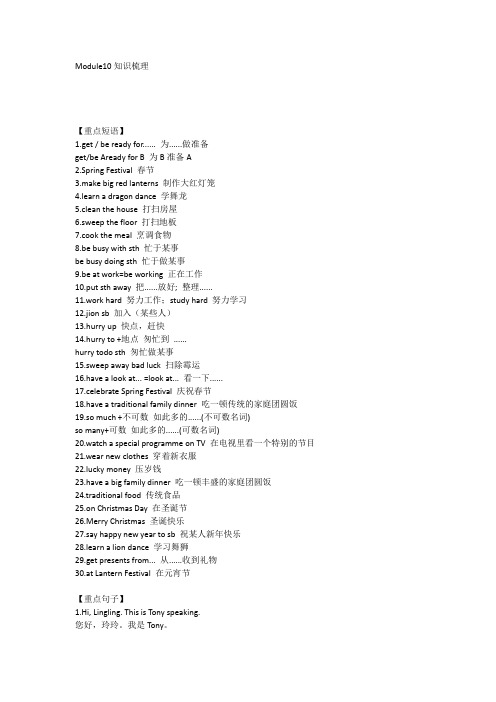
Module10知识梳理【重点短语】1.get / be ready for...... 为......做准备get/be Aready for B 为B准备A2.Spring Festival 春节3.make big red lanterns 制作大红灯笼4.learn a dragon dance 学舞龙5.clean the house 打扫房屋6.sweep the floor 打扫地板7.cook the meal 烹调食物8.be busy with sth 忙于某事be busy doing sth 忙于做某事9.be at work=be working 正在工作10.put sth away 把......放好; 整理......11.work hard 努力工作;study hard 努力学习12.jion sb 加入(某些人)13.hurry up 快点,赶快14.hurry to +地点匆忙到......hurry todo sth 匆忙做某事15.sweep away bad luck 扫除霉运16.have a look at... =look at... 看一下......17.celebrate Spring Festival 庆祝春节18.have a traditional family dinner 吃一顿传统的家庭团圆饭19.so much +不可数如此多的......(不可数名词)so many+可数如此多的......(可数名词)20.watch a special programme on TV 在电视里看一个特别的节目21.wear new clothes 穿着新衣服22.lucky money 压岁钱23.have a big family dinner 吃一顿丰盛的家庭团圆饭24.traditional food 传统食品25.on Christmas Day 在圣诞节26.Merry Christmas 圣诞快乐27.say happy new year to sb 祝某人新年快乐28.learn a lion dance 学习舞狮29.get presents from... 从......收到礼物30.at Lantern Festival 在元宵节【重点句子】1.Hi, Lingling. This is Tony speaking.您好,玲玲。
Unit 10单词讲解 人教版七年级英语下册
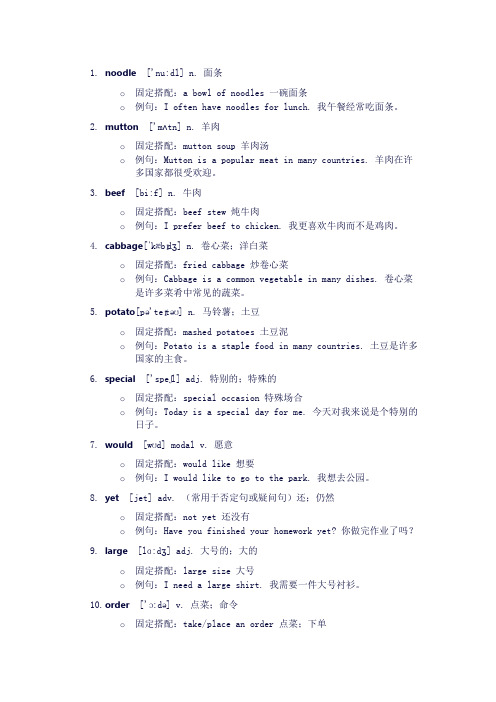
1.noodle['nu:dl] n. 面条o固定搭配:a bowl of noodles 一碗面条o例句:I often have noodles for lunch. 我午餐经常吃面条。
2.mutton['mʌtn] n. 羊肉o固定搭配:mutton soup 羊肉汤o例句:Mutton is a popular meat in many countries. 羊肉在许多国家都很受欢迎。
3.beef[bi:f] n. 牛肉o固定搭配:beef stew 炖牛肉o例句:I prefer beef to chicken. 我更喜欢牛肉而不是鸡肉。
4.cabbage[ˈkæbɪdʒ] n. 卷心菜;洋白菜o固定搭配:fried cabbage 炒卷心菜o例句:Cabbage is a common vegetable in many dishes. 卷心菜是许多菜肴中常见的蔬菜。
5.potato[pə'teɪtəʊ] n. 马铃薯;土豆o固定搭配:mashed potatoes 土豆泥o例句:Potato is a staple food in many countries. 土豆是许多国家的主食。
6.special['speʃl] adj. 特别的;特殊的o固定搭配:special occasion 特殊场合o例句:Today is a special day for me. 今天对我来说是个特别的日子。
7.would[wʊd] modal v. 愿意o固定搭配:would like 想要o例句:I would like to go to the park. 我想去公园。
8.yet[jet] adv. (常用于否定句或疑问句)还;仍然o固定搭配:not yet 还没有o例句:Have you finished your homework yet? 你做完作业了吗?rge[lɑ:dʒ] adj. 大号的;大的o固定搭配:large size 大号o例句:I need a large shirt. 我需要一件大号衬衫。
外研社七年级上册英语 Module 10 词汇与语法基础(解析版)
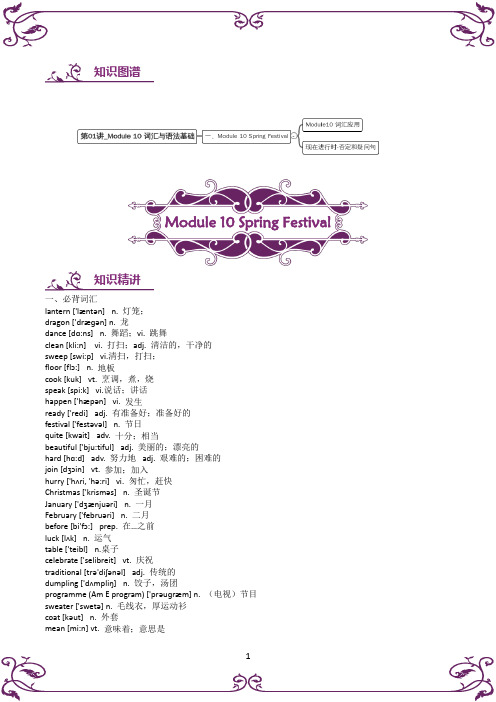
知识图谱Module 10 Spring Festival知识精讲一、必背词汇lantern ['læntən] n. 灯笼;dragon ['dræɡən] n. 龙dance [dɑ:ns]n. 舞蹈;vi. 跳舞clean [kli:n] vi. 打扫;adj. 清洁的,干净的sweep [swi:p] vi.清扫,打扫;floor [flɔ:] n. 地板cook [kuk] vt. 烹调,煮,烧speak [spi:k] vi.说话;讲话happen ['hæpən] vi. 发生ready ['redi] adj. 有准备好;准备好的festival ['festəvəl] n. 节日quite [kwait] adv. 十分;相当beautiful ['bju:tiful] adj. 美丽的;漂亮的hard [hɑ:d]adv. 努力地adj. 艰难的;困难的join [dʒɔin] vt. 参加;加入hurry ['hʌri, 'hə:ri] vi. 匆忙,赶快Christmas ['krisməs] n. 圣诞节January ['dʒænjuəri] n. 一月February ['februəri] n. 二月before [bi'fɔ:] prep. 在…之前luck [lʌk] n. 运气table ['teibl] n.桌子celebrate ['selibreit] vt. 庆祝traditional [trə'diʃənəl] adj. 传统的dumpling ['dʌmpliŋ]n. 饺子,汤团programme (Am E program) ['prəuɡræm] n. (电视)节目sweater ['swetə] n. 毛线衣,厚运动衫coat [kəut] n. 外套mean [mi:n] vt. 意味着;意思是lucky ['lʌki] adj.幸运的merry ['meri] adj. 愉快的;高兴地tell [tel] vt. 告诉;讲二、重点词汇1. celebrate verb /ˈseləbreɪt/1). to take part in special enjoyable activities in order to show that a particular occasion is important庆祝,庆贺;祝贺例句:We always celebrate our wedding anniversary by going out to dinner.每年的结婚纪念日我们都出去吃饭庆祝。
七年级英语第十单元知识点归纳

Unit10I’dlikesomenoodles.【短语归纳】1.wouldlike想要2.takeone’sorder=haveone’sorder点菜3.beefsoup牛肉汤4.onebowlof…一碗……5.whatsizeof什么尺寸6.mapo tofuwithrice带米饭的麻婆豆腐7.whatkindof什么种类8.asmall/medium/largebowlof....一份小/中/大碗..9.greentea绿茶10.orangejuice橘汁11.aroundtheworld世界各地12.birthdaycake生日蛋糕13.thenumberof…的数量14.makeawish许个愿望15.blowout吹灭16.inonego一口气etrue实现18.cutup切碎19.beefandtomatonoodles=noodleswithbeefandtomatoes牛肉西红柿面20.abigbowlfor4yuan,asmalloneforjust2yuan大碗的4元一碗,小碗的2元21.getpopular/getlost.....(get+形容词,表示变得怎么样)受欢迎,流行22.bring...to..给某人带来什么或把某物带到某地bringgoodluckto...给...带来好运23.have...for+三餐haveeggsandnoodlesforbreakfast24.beshortof缺少25.Special1特色菜126.onone’sbirthday在某人的生日27.eatlongnoodles吃长寿面28.puton带上,穿上29.don’tworry别着急【用法集萃】1.wouldlikesth.想要某物2.1)wouldliketodosth=wanttodosth.想要做某事例如:I’dliketogoshopping.我想去购物2)wouldlikesb.todosth.想要某人做某事例如:She’dlikeyoutocookdinner.她想要你做晚饭。
英语初中七年级下册第十单元单词

英语初中七年级下册第十单元单词全文共5篇示例,供读者参考英语初中七年级下册第十单元单词11、curly adj.卷曲的2、straight adj.直的'3、tall adj.高的4、medium adj. 中等的5、height n.身高;高度6、of medium height中等身高7、thin adj.瘦的8、heavy adj.重的9、build n.身材10、of medium build中等身材11、tonight adv.n.今夜12、little adj.小的13、a little 一点,少量14、cinema n.电影院15、glasses n.眼镜16、later adj.以后17、handsome adj.英俊的18、actor n.演员19、actress n.女演员20、person n.人21、nose n.鼻子22、blonde adj.金黄色的23、mouth n.嘴24、round adj.圆形的25、face n.脸26、eye n.眼睛27、singer n.歌手28、artist n.艺术家29、crime n.犯罪活动30、criminal n.罪犯31、put v.放32、each adj.pron.每个,各自英语初中七年级下册第十单元单词21、guitar n.吉他2、sing v.唱;唱歌3、swim v.游泳4、dance v.跳舞;舞蹈5、draw v.画6、chess n.国际象棋7、play chess 下国际象棋8、speak v.说;说话8、speak english 说英语9、join v.参加;加入10、club n.俱乐部;社团11、be good at… 擅长于……12、tell v. n讲述;告诉13、story n故事;小说14、write v.写作,写字15、show n.演出;表演v.展示;16、or conj.或者17、talk v. n说话;谈话18、talk to … 跟……说19、kungfu n.(中国)功夫20、drum n.鼓21、play the drums 敲鼓22、piano n.钢琴23、play the piano 弹钢琴24、violin n.小提琴25、play the violin 拉小提琴26、also adv也;而且27、people n人;人们28、home n 家,活动本部.adv到家;在家29、be good with… 善于应付……的;对……有办法30、make v.使成为;制造31、make friends 结交朋友32、today adv.在今天33、help (sb)with sth 在某方面帮助(某人)34、center n(=centre)中心,中央35、weekend. n.周末36、on the weekend. (在)周末37、teach v教,讲授38、musician n.音乐家英语初中七年级下册第十单元单词31、up adv 向上2、get up 起床;站起3、dress v.穿衣服n.连衣裙4、get dressed 穿上衣服5、brush v.刷刷净n.刷子6、tooth n.(pl. teeth)牙齿7、shower n.v淋浴;淋浴器(间)8、take a shower 洗淋浴9、usually adv.通常地;一般地10、forty nu四十11、wow intery.(表示惊奇或敬佩)哇;呀12、never adv从不;绝不13、early adv. adj早(的)14、fifty nu五十15、job n.工作;职业16、work n.& v.工作17、station n.电视台;车站18、radio station 广播电台19、o'clock adv.(表示整点)…点钟20、night n.晚上;夜晚21、funny adj奇怪的.;滑稽好笑的22、exercise v.n锻炼;练习23、on weekends. (在)周末24、best adj.& adv.最好的(地)25、half n.一半,半数26、past prep.晚于;过(时间)adj.过去的27、quarter n.一刻钟;四分之一28、homework n.家庭作业29、do (one’s)homework 做作业30、run v 跑;奔31、clean v打扫;弄干净;adj干净的32、walk n.&v.行走;步行33、take a walk 散步走一走34、quickly adv很快地35、either adv或者;也(用在否定词组后)36、either…or …… 要么……要么……;或者……或者……37、lot pron. 大量;许多38、lots of 大量;许多39、sometimes adv.有时40、taste v.有…的味道;品尝n.味道;滋味41、life n.生活,生命英语初中七年级下册第十单元单词41、train n.火车2、bus n.公交车3、subway n.地铁4、take the subway 乘地铁5、ride v骑n旅行6、bike n.自行车a7、ride a bike 骑自行车8、sixty nu六十9、seventy nu七十10、eighty nu八十11、ninety nu九十12、hundred nu一百13、minute n.分钟14、far adv.&adj远;远的15、kilometer n.公里16、new adj.新的';刚出现的17、every adj.每一;每个18、every day 每天19、by prep.(表示方式)乘(交通工具)20、by bike 骑自行车21、drive v.开车22、car n.小汽车;轿车23、live v.居住;生活24、stop n.车站;停止25、think of 认为26、cross v.横过;越过27、river n.河;江28、many adj.&pron.许多29、village n.村庄;村镇30、between prep.介于…之间31、between… and… 在……和……之间32、bridge n.桥33、boat n.小船34、ropeway n.索道35、year n.年;岁36、afraid adj.害怕;惧怕37、like prep.像;怎么样38、leave v.离开39、dream n.梦想;睡梦v.做梦40、true adj.真的;符合事实的41、come true 实现;成为现实英语初中七年级下册第十单元单词51、rule n.规则;规章2、arrive v.到达3、(be)on time 准时4、hallway n.走廊;过道5、hall n.大厅;礼堂6、dining hall 餐厅7、listen v.听;倾听8、listen to… 听……9、fight v. &n.打架;战斗10、sorry adj.抱歉的;难过的;惋惜的11、outside adv在外面adj 外面的12、wear v.穿;戴13、important adj.重要的14、bring v.带来;取来15、uniform n.校服;制服16、quiet adj安静的17、out adv.外出18、go out 外出(娱乐)19、practice v.& n.练习20、dish n.碟;盘21、do the dishes 清洗餐具22、before prep. conj在… 以前adv以前23、make (one’s)bed 铺床24、dirty adj.脏的25、kitchen n.厨房26、more adj. pron.更多的27、noisy adj.吵闹的28、relax v.放松;休息29、read v.读;阅读30、terrible adj.非常讨厌的;可怕的31、feel v.感受;觉的'32、strict adj.严格的;严厉的33、be strict (with sb)(对某人)要求严格34、remember v.记住;记起35、follow v.遵循;跟随36、follow the rules 遵守规则37、luck n.幸运;运气38、keep v.保持;保留39、hair n.头发;毛发40、learn v. 学习;学会。
外研社版七年级上册英语书单词表

外研社版七年级上册英语书单词表Module 1.hello /həˈləʊ/ int. 你好,喂。
class /klɑːs/ n. 同学;班级。
my /maɪ/ pron. 我的。
name /neɪm/ n. 名字。
is /ɪz/ v. 是(be的第三人称单数现在式)Miss /mɪs/ n. 小姐(对未婚女性的称呼),老师。
good /gʊd/ adj. 好的。
morning /ˈmɔːnɪŋ/ n. 早晨,上午。
good morning 早上好。
afternoon /ˌɑːftəˈnuːn/ n. 下午。
good afternoon 下午好。
goodbye /ˌgʊdˈbaɪ/ int. 再见。
I /aɪ/ pron. 我。
am /æm/ v. 是(be的第一人称单数现在式)I'm = I am 我是。
Mr /ˈmɪstə(r)/ n. 先生。
what /wɒt/ pron. 什么?your /jɔː(r)/ pron. 你的;你们的。
please /pliːz/ int. 请。
sorry /ˈsɒri/ adj. 对不起的;抱歉的。
can /kæn/ v. aux. 能;会。
you /juː/ pron. 你;你们。
spell /spel/ v. 拼写。
it /ɪt/ pron. 它。
yes /jes/ int. 是;是的。
thank /θæŋk/ v. 谢谢。
how /haʊ/ adv. 怎样;如何。
are /ɑː(r)/ v. 是(be的复数和第二人称单数现在式)fine /faɪn/ adj. 健康的;美好的。
thanks /θæŋks/ int. 多谢。
OK /əʊˈkeɪ/ int. 行;好。
Module 2.this /ðɪs/ pron. 这;这个(指较近的人或事物)pencil /ˈpensl/ n. 铅笔。
pen /pen/ n. 钢笔。
新目标英语7年级上unit 10单词及课文翻译(全文)

136
文东英语系列丛书
新目标英语7年级(上)Unit
10
汉语 22 23 24 25 26 27 28 29 30 31 32 33 34 35 59 59 59 59 59 59 59 60 60 60 星期日;星期天 下午 中国功夫 可能;可以 画 少许;少量 少许;少量 电子邮件 地址;通讯处 为什么 詹妮弗(女名) 维克多(男名) 辛蒂(女名) 琼斯(姓) 你会弹吉他吗? 我想加入音乐俱乐部。 噢,你会唱歌吗?不,我不会。 我想加入艺术俱乐部。 你会绘画吗?是的,我会。 你会游泳吗?是的,我会。 你会讲英语吗? 你们想参加什么俱乐部? 我们想参加象棋俱乐部。 你会下棋吗?不,我不会。我会。
文东英语系列丛书
新目标英语7年级(上)Unit
10
模块1:
天道酬勤——基础词句
英语 词性 音标
汉语 1 2 3 4 5 6 7 8 9 10 11 12 13 14 15 16 17 18 19 20 21 吉他 参加;加入 跳舞;舞蹈 游泳 唱歌 国际象棋 画画 说;说话 小孩;年轻人 我们的 鼓 钢琴 喇叭 小提琴 或者 音乐家; 那时;然后 是(表示状态) 摇滚乐 乐队 表演;展示;给…看
英语
词性
音标
137
文东英语系列丛书
新目标英语7年级(上)Unit
10
60 60 60 60 60 60 61 61 61 61 61 61 61 61 61 61 61 61 61 62 62 62 63 63
你会跳舞吗?是的,我会。不,我不会。 他会绘画吗?是的,他会。不,他不会。 她会讲英语吗?是的,她会。不,她不会。 你们会讲英语吗?是的,我们会。不,我们不会。 你想参加什么俱乐部? 我想参加篮球俱乐部。 你想参加什么俱乐部?我不知道。 你会做什么?我会弹吉他。 你们会做什么? 我们会绘画。我会唱歌。 你会弹吉他吗?是的,我会。 你能弹得好吗?不,我不能, 汤姆会弹吉他,但她谈得不是很好。 你能帮助小孩子游泳吗?是的,我能。 招聘 你和孩子们相处得好吗? 我们北戴河学校之旅需要帮助。 你能帮助: 运动 来加入 是的,他会,但是他不会唱歌。 学校音乐节招聘音乐人。 你是一位音乐人吗?
人教版英语七年级下Unit10单词、知识梳理、词汇句式精讲

人教版英语七年级下Unit10单词、知识梳理、词汇句式精讲Unit10 单词(音标)noodle ['nuːdl] n. 面条mutton ['mʌtn] n. 羊肉beef [biːf] n. 牛肉cabbage ['kæbɪdʒ] n. 卷心菜;洋白菜potato [pə'teɪtəʊ] n.土豆;马铃薯special ['speʃəl] n.特色菜;特价品adj. 特别的;特殊的would [wʊd] modal v.(表示意愿)愿意would like愿意;喜欢yet [jet] adv. (常用于否定句和疑问句)还;仍然large [lɑː(r)dʒ] adj.大号的,大的order ['ɔː(r)də(r)] n.&v. 点菜;命令takeone’s order 点菜size [saɪz] n. 大小;尺码bowl [bəʊl] n. 碗one(large) bowl of…一(大)碗tofe [təʊfu:] n. 豆腐meat [miːt] n. (可食用的)肉dumpling ['dʌmplɪŋ] n.饺子porridge ['pɒrɪdʒ] n. 粥;面糊onion ['ʌnjən] n. 洋葱fish [fɪʃ] n. 鱼;鱼肉pancake ['pænkeɪk] 烙饼;薄饼world [wɜː(r)ld] n. 世界aroundthe world世界各地answer ['ɑːnsə] v. 回答n. 答案different ['dɪfərənt] adj.不同的cake [keɪk] n. 蛋糕candle ['kændl] n. 蜡烛age [eɪdʒ] n. 年龄makea wish许愿blow [bləʊ] v. 吹blowout吹灭if [ɪf] conj. 如果will [wɪl] v. 将要;会the UK(=theUnited Kingdom) [,ju:’keɪ]([jʊ'naɪtɪd ‘kɪŋdəm]) n.英国candy ['kændi] n. 糖果lucky ['lʌki] adj. 幸运的popular ['pɒpjʊlə] adj.受欢迎的;普遍的getpopular受欢迎;流行cutup切碎idea [aɪ'dɪə] n.想法;主意bring good luck to…给……带来好运Unit10 知识梳理【重点短语】1. would like sth. 想要某物2. would like to do sth. 想要做某事3. put on 穿上,戴上4. take one’s order 点菜5. in the beef noodles 在牛肉面里6. mapo tofu with rice麻婆豆腐外带大米7. what kind of noodles什么种类的面条8. a large bowl of noodles一大碗面条9. a medium bowl of noodles 一中碗面10. a small bowl of noodles 一小碗面条11. what size 什么尺寸12.May I take your order? 可以点餐了么?13. beef noodles with carrots带有胡萝卜的牛肉面14. green tea 绿茶15. orange juice 橙汁16. around the world 世界各地17. in different countries 在不同的国家18. birthday cakes with candles带蜡烛的生日蛋糕19. the birthday person 寿星20.make a wish 许愿21. blow out the candles 吹灭蜡烛22. in one go 一口气,一次性的23. come true 实现24. get popular 变得流行,受欢迎25. long noodles 长寿面26. cut up 切碎/断27. a symbol of long life 长寿的象征28. be different 不同的29. be the same 一样的30. bring good luck to sb. 带给某人幸运31. have different kinds of …有不同种类的......【重点句型】1. What would you like?您需要什么?2. I'm not sure yet. Are there any vegetables in the beef noodles? 我不确定,牛肉面里有蔬菜吗?3. Yes, there are some tomatoes.有,里面有西红柿。
七年级英语上册第十单元单词短语汇总
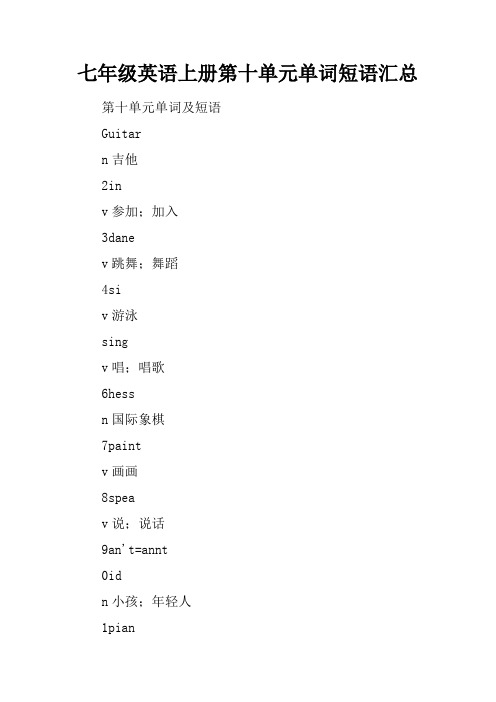
七年级英语上册第十单元单词短语汇总
第十单元单词及短语 Guitar n 吉他 2in v 参加;加入 3dane v 跳舞;舞蹈 4si v 游泳 sing v 唱;唱歌 6hess n 国际象棋 7paint v 画画 8spea v 说;说话 9an't=annt 0id n 小孩;年轻人 1pian
0元 缺 短 再 延 足 底 注 码 头 封 ”然 “购 离 债 兼 稽 述 书 更 回 至 端 纠 细 详 决 压 抵 白 妥 参 果 潜 掘 挖 照 流 系 体 已 议 耗 消 低 降 考 测 地 源 辟 筹 拟 预 岗 给 握 掌 沟 构 机 厉 较 题 服 极 挥 承 点 酬 贴 津 托 委 授 联 小 大 性 两 常 必 福 输 运 维 辆 辅 固 次 询 问 疑 如 鉴 印 际 否 容 除 移 登 采 设 星 零 与 括 包 能 控 遗 坏 来 往 响 影 周 力 施 措 润 象 所 索 向 召 惩 奖 浪 约 节 仓 见 意 改 修 阻 劝 权 置 临 落 断 诊 求 展 针 面 草 害 同 请 卷 史 售 正 材 检 半 劳 楚 到 做 催 货 废 亏 盈 盘 减 增 督 监 高 厂 车 始 原 历 累 积 整 集 搜 动 活 好 搞 品 达 级 缴 上 税 织 组 实 促 贷 信 划 综 产 根 犯 侵 令 策 遵 强 统 彻 贯 真 纪 家 国 格 映 析 济 企 化 推 配 调 导 董 试 布 释 善 完 充 待 开 础 基 业 任 责 负 则 附 退 辞 错 为 渎 损 受 遭 益 致 守 忽 玩 于 失 生 内 污 贪 密 秘 露 泄 谋 弊 舞 私 营 弄 物 骗 冒 占 非 便 匿 隐 灭 毁 谎 变 伪 假 虚 绝 拒 乱 混 重 严 造 聘 解 反 违 式 蓄 储 将 套 个 位 户 利 挪 自 擅 未 替 顶 留 使 围 范 : 3倍 1— 薪 告 警 予 对 之 列 下 法 罚 摘 阅 查 带 携 录 类 加 前 专 指 盖 名 张 止 起 年 度 季 份 标 册 成 订 装 顺 号 归 均 值 价 保 他 文 簿 是 凡 八 案 档 章 相 结 清 日 项 载 笔 逐 目 全 健 立 建 七 关 别 知 通 须 都 汇 何 论 续 算 送 复 天 间 助 补 种 处 进 放 时 副 管 主 表 编 代 料 供 每 门 各 室 办 政 据 依 四 帐 记 制 误 无 量 数 纳 出 手 证 领 销 效 有 认 及 费 旅 差 发 凭 五 定 规 本 合 符 扣 资 月 在 即 期 还 过 执 序 程 按 方 字 签 总 、 交 ; 核 审 计 会 要 作 工 职 后 和 途 明 并 》 单 借 《 写 填 当 三 准 批 理 经 报 先 事 的 坐 需 确 况 情 殊 特 因 接 直 收 得 不 取 提 款 或 中 限 库 从 可 现 员 人 务 财 九 十 二 入 存 应 分 部 额 超 条 六 第 。 账 转 行 银 等 票 以 律 一 余 其 , 外 付 支 金 用 备 司 公 由 径 者
外研版七年级英语上册Module10知识点
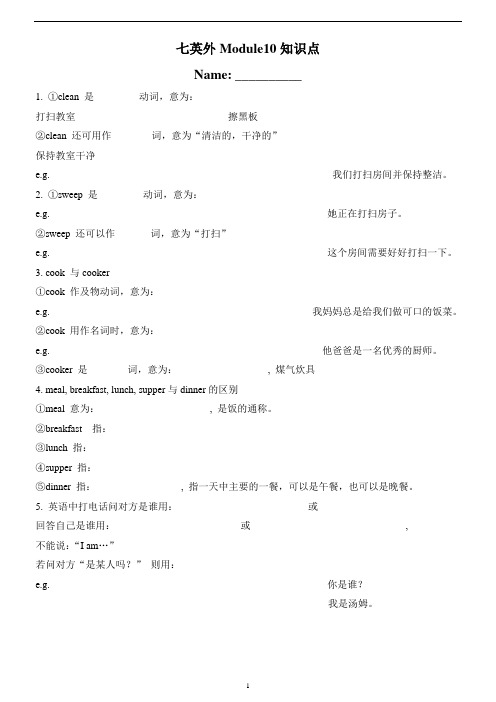
七英外Module10知识点Name: __________1. ①clean 是_________动词,意为:____________________打扫教室_______________________ 擦黑板_________________________②clean 还可用作________词,意为“清洁的,干净的”保持教室干净___________________________________________e.g. ______________________________________________________ 我们打扫房间并保持整洁。
2. ①sweep 是________ 动词,意为:______________e.g. ______________________________________________________ 她正在打扫房子。
②sweep 还可以作_______词,意为“打扫”e.g. ______________________________________________________ 这个房间需要好好打扫一下。
3. cook 与cooker①cook 作及物动词,意为:___________e.g. ____________________________________________________我妈妈总是给我们做可口的饭菜。
②cook 用作名词时,意为:___________________e.g. ______________________________________________________他爸爸是一名优秀的厨师。
③cooker 是________词,意为:__________________, 煤气炊具_______________________4. meal, breakfast, lunch, supper与dinner的区别①meal 意为:______________________, 是饭的通称。
人教版七年级上册英语词汇Unit10——11词汇

人教版七年级上册英语词汇Unit 10——11词汇Unit 1074. join v.参加;加入join sb. 加入某人的行列,和某人一起做某事join + 集体名词:加入某个团体或组织,成为其中一员join in …参加活动take part in… 参加活动并起到积极作用attend 出席,到场(不一定做事)75. speak v.说;说话speak to sb.(上对下,老对幼)说话,谈话speak + 语言:说……语言76. can't = can not 不能 (+动词原形77. violin n.小提琴play the violin 拉小提琴注:演奏乐器时,乐器名称前用the78. may v.可能;可以 (+动词原形)79. little adj.少许的;少量的(否定,不可数)a little 少量;稍许(肯定,不可数)few adj./ pron. 少,少数(否定,可数)a few 几个,少许(肯定,可数)80. why adv.(疑问副词)为什么;怎么?Why not do…? 何不…?Why don’y you/ we do…? 我们何不…?人教版七年级上册英语词汇Unit 11Unit 1181. usually adv.通常usual adj. 平常的,往常的as usual 象往常一样82. teeth n.(tooth的复数形式)牙齿foot ---- feet 足,脚;英尺goose ---- geese 鹅83. get to 到达 + n.get home/ there/ here到家 / 那里 / 这里84. best adj.& adv. (good, well的比较级) 最好的(地)85. wish n.希望;祝愿(表祝愿)Best wishes to you! 祝你好运Wish you all the best! 祝你好运86. soon adv.不久as soon as…一…….就……as soon as sb. can 尽可能快as soon as possible 尽快sooner or later 迟早87. survey n.调查;考察make/ have a survey。
人教版七年级英语(下册)Unit 10词汇、句型精讲

人教版▏七年级英语(下册)Unit 10 词汇、句型精讲词汇精讲1. potatopotato 可数名词,意为“土豆、马铃薯”,其复数形式为potatoes。
例如:I don’t like potatoes. 我不喜欢马铃薯。
注意:部分以字母o结尾的名词,变为复数时,在词尾加-es。
例如:tomato (西红柿) → tomatoeshero (英雄) → heroesNegro (黑人) → Negroes我们可以用“黑人英雄爱吃西红柿和马铃薯”这个顺口溜来记住这几个词。
2. sizesize是名词,它的意思是“尺寸、大小”,既可以表示物体的大小,又可以表示服装、鞋帽的尺码、号码。
What size引导的特殊疑问句经常用来询问规格或者尺码。
例如:-What size shirt do you want? 你要多大号的衬衫?-I want size 36. 我要36号的。
3. small, medium&largesmall, medium, large都可以用来表示物体的型号,small是小号,medium是中号,large 是大号。
这三个词可以放在表示量的词前做修饰,来说明具体的要求。
例如,a bowl of 的意思是“一碗”,表示“大碗、中碗、小碗”时,分别在bowl前面加上“large, medium, small”即可。
例如:-What would you like? 您想要点什么?-I’d like a large bowl o f beef noodles. 我要一大碗牛肉面。
4. special(1)special作名词时,意为“特色菜、特价品、特别的事物”等。
例如:The train is a special for the football game.那班火车是为足球赛开的专车。
The menu changes regularly and there are daily specials to choose from.菜谱定期更换,而且每天都有特色菜供选择。
七年级下册英语第十单元单词
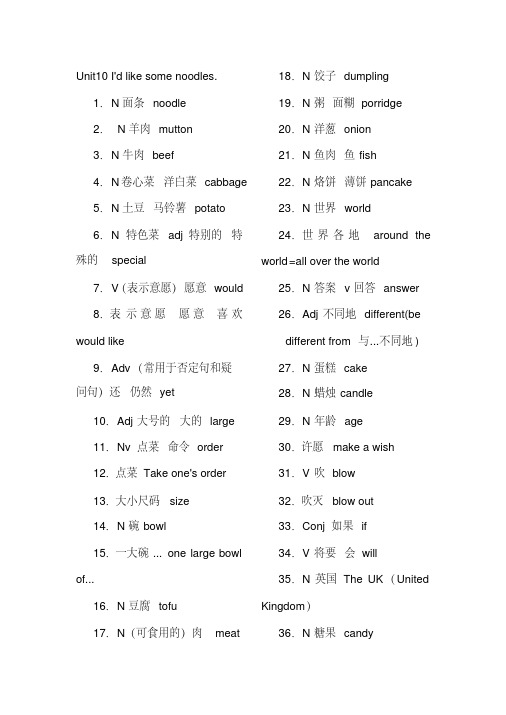
Unit10 I'd like some noodles.1.N面条noodle2.N羊肉mutton3.N牛肉beef4.N卷心菜洋白菜cabbage 5.N土豆马铃薯potato6.N特色菜adj特别的特殊的special7.V(表示意愿)愿意would8.表示意愿愿意喜欢would like9.Adv(常用于否定句和疑问句)还仍然yet10.Adj大号的大的large11.Nv 点菜命令order12.点菜Take one's order13.大小尺码size14.N碗bowl15.一大碗... one large bowl of...16.N豆腐tofu17.N(可食用的)肉meat18.N饺子dumpling19.N粥面糊porridge20.N洋葱onion21.N鱼肉鱼fish22.N烙饼薄饼pancake23.N世界world24.世界各地around the world=all over the world25.N答案v回答answer26.Adj不同地different(bedifferent from 与...不同地)27.N蛋糕cake28.N蜡烛candle29.N年龄age30.许愿make a wish31.V吹blow32.吹灭blow out33.Conj 如果if34.V将要会will35.N英国The UK(United Kingdom)36.N糖果candy37.Adj幸运的lucky38.Adj受欢迎的普遍的popular39.受欢迎流行get popular40.切碎cut up41.N想法注意idea42.给...带来好运bring good luck to...43.What kind of noodles would you like ?44.I'd like beef noodles ,please.45.What size would you like ?46.I'd like a large bowl , please.47.Would you like a large bowl?48.Yes, please.49.Is there any meat in the tomato and egg soup ?50.No, there isn't any ./No, there is no meat.51.。
外研版初中英语七年级上册 module10 单词
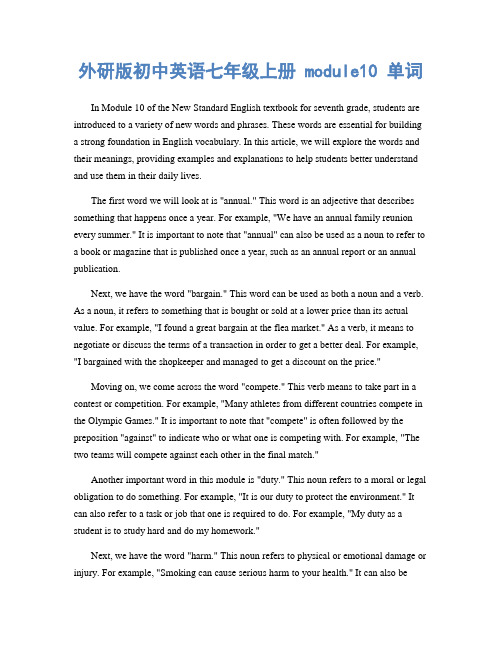
外研版初中英语七年级上册 module10 单词In Module 10 of the New Standard English textbook for seventh grade, students are introduced to a variety of new words and phrases. These words are essential for building a strong foundation in English vocabulary. In this article, we will explore the words and their meanings, providing examples and explanations to help students better understand and use them in their daily lives.The first word we will look at is "annual." This word is an adjective that describes something that happens once a year. For example, "We have an annual family reunion every summer." It is important to note that "annual" can also be used as a noun to refer to a book or magazine that is published once a year, such as an annual report or an annual publication.Next, we have the word "bargain." This word can be used as both a noun and a verb. As a noun, it refers to something that is bought or sold at a lower price than its actual value. For example, "I found a great bargain at the flea market." As a verb, it means to negotiate or discuss the terms of a transaction in order to get a better deal. For example, "I bargained with the shopkeeper and managed to get a discount on the price."Moving on, we come across the word "compete." This verb means to take part in a contest or competition. For example, "Many athletes from different countries compete in the Olympic Games." It is important to note that "compete" is often followed by the preposition "against" to indicate who or what one is competing with. For example, "The two teams will compete against each other in the final match."Another important word in this module is "duty." This noun refers to a moral or legal obligation to do something. For example, "It is our duty to protect the environment." It can also refer to a task or job that one is required to do. For example, "My duty as a student is to study hard and do my homework."Next, we have the word "harm." This noun refers to physical or emotional damage or injury. For example, "Smoking can cause serious harm to your health." It can also beused as a verb, meaning to cause damage or injury. For example, "It is important not to harm others with our words or actions."Moving on, we come across the word "income." This noun refers to the money that one earns from work or investments. For example, "His monthly income is enough to support his family." It is important to note that "income" can be used in different contexts, such as "gross income" and "net income," which refer to different calculations and deductions related to one's earnings.Lastly, we have the word "journey." This noun refers to a trip or travel from one place to another. For example, "We had a long journey from our hometown to the capital city." It can also be used metaphorically to refer to a process or experience of personal growth or development. For example, "Life is a journey, and we must make the most of it."In conclusion, the words introduced in Module 10 of the New Standard English textbook for seventh grade are essential for building a strong vocabulary foundation. Understanding and using these words correctly will not only improve students' English language skills but also enhance their ability to communicate effectively in various contexts. By incorporating these words into their daily lives and practicing their usage, students will be well-equipped to express themselves confidently and accurately in English.。
新外研版七年级英语上册 Module 10 模块知识点归纳
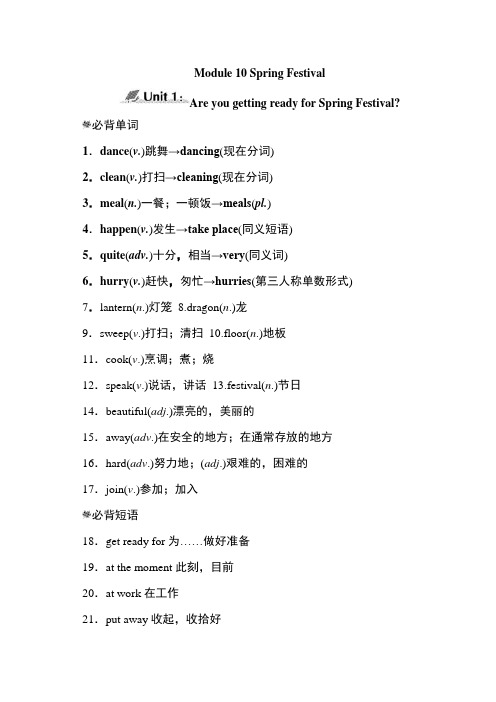
Module 10 Spring FestivalAre you getting ready for Spring Festival? 必背单词1.dance(v.)跳舞→dancing(现在分词)2.clean(v.)打扫→cleaning(现在分词)3.meal(n.)一餐;一顿饭→meals(pl.)4.happen(v.)发生→take place(同义短语)5.quite(adv.)十分,相当→very(同义词)6.hurry(v.)赶快,匆忙→hurries(第三人称单数形式) 7.lantern(n.)灯笼8.dragon(n.)龙9.sweep(v.)打扫;清扫10.floor(n.)地板11.cook(v.)烹调;煮;烧12.speak(v.)说话,讲话13.festival(n.)节日14.beautiful(adj.)漂亮的,美丽的15.away(adv.)在安全的地方;在通常存放的地方16.hard(adv.)努力地;(adj.)艰难的,困难的17.join(v.)参加;加入必背短语18.get ready for为……做好准备19.at the moment此刻,目前20.at work在工作21.put away收起,收拾好22.hurry up赶快必背句子23.This is Tony speaking.我是托尼。
24.I'm making big red lanterns.我在做大红灯笼。
25.She's working so hard!她正如此努力地干活!26.Can I join them?我可以加入他们吗?My mother's cleaning our house andsweeping away bad luck.必背单词1.before(prep.)在……之前→after(反义词)在……之后2.luck(n.)运气→lucky(adj.)幸运的→luckily(adv.)幸运地3.celebrate(v.)庆祝→celebration(n.)庆祝4.traditional(adj.)传统的→tradition(n.)传统5.Christmas(n.)圣诞节6.merry(adj.)愉快的,高兴的7.February(n.)二月8.January(n.)一月9.table(n.)桌子10.dumpling(n.)饺子,团子11.programme(n.)(电视)节目12.sweater(n.)厚运动衫;毛线衣13.coat(n.)外套14.mean(v.)意思是;意味着必背短语15.sweep away扫去16.Spring Festival春节17.a kind of一种18.bad luck坏运;霉运必背句子19.It usually comes in February, but sometimes it comes in January.它通常是在二月份,但有时在一月。
外研版英语七年级上册 module10 单词

外研版英语七年级上册 module10 单词Module 10 of the New Standard English textbook for seventh grade covers a variety of vocabulary words. In this article, we will explore these words in detail and provide examples to help students better understand and use them in their daily lives.The first set of words we will discuss are adjectives related to personal appearance. These words describe how someone looks. For example, "tall" means a person is higher in height than average, while "short" means the opposite. "Slim" describes someone who is thin, and "overweight" refers to someone who is heavier than the average weight for their height. It's important to remember that these words should be used respectfully and not to make fun of others.Moving on, we have a set of words related to leisure activities. These words can be used to talk about hobbies and things people do in their free time. For instance, "swimming" is a popular activity that involves moving through water using your arms and legs. "Cycling" refers to riding a bicycle, and "dancing" involves moving your body rhythmically to music. These activities are not only enjoyable but also help to keep us physically active and healthy.Next, we have a group of words related to school subjects. These words are essential for students as they describe the different subjects they study in school. For example, "mathematics" involves numbers, calculations, and problem-solving. "English" is the study of the English language, including reading, writing, and speaking skills. "Science" refers to the study of the natural world, and "history" is the study of past events. It's important for students to have a good understanding of these subjects to excel academically.Moving on, we have a set of words related to daily routines. These words describe the activities we do every day. For example, "wake up" means to stop sleeping and open your eyes in the morning. "Brush" refers to using a toothbrush to clean your teeth, and "have breakfast" means to eat a meal in the morning. "Go to school" is a phrase used todescribe the act of attending classes, and "do homework" means to complete assignments given by teachers. These words help us talk about our daily lives and routines.Next, we have a group of words related to food and drinks. These words describe different types of food and beverages. For example, "rice" is a staple food in many countries, and "noodles" are a type of pasta made from flour. "Juice" refers to a liquid that is extracted from fruits, and "water" is a clear, tasteless liquid that is essential for our survival. These words are important for students to know as they help us communicate about our dietary preferences and make food choices.Moving on, we have a set of words related to weather. These words describe different types of weather conditions. For example, "sunny" means the sun is shining brightly, and "cloudy" means the sky is covered with clouds. "Rainy" describes a situation where water falls from the sky, and "windy" means there is a lot of wind blowing. These words help us talk about the weather and plan our activities accordingly.Lastly, we have a group of words related to emotions. These words describe how we feel. For example, "happy" means feeling joyful and content, while "sad" means feeling unhappy or sorrowful. "Angry" describes a feeling of strong displeasure, and "excited" means feeling enthusiastic or eager. These words help us express our emotions and communicate with others effectively.In conclusion, Module 10 of the New Standard English textbook for seventh grade introduces a variety of vocabulary words. These words cover personal appearance, leisure activities, school subjects, daily routines, food and drinks, weather, and emotions. By understanding and using these words correctly, students can expand their vocabulary and improve their communication skills.。
最新七年级下册第十单元单词
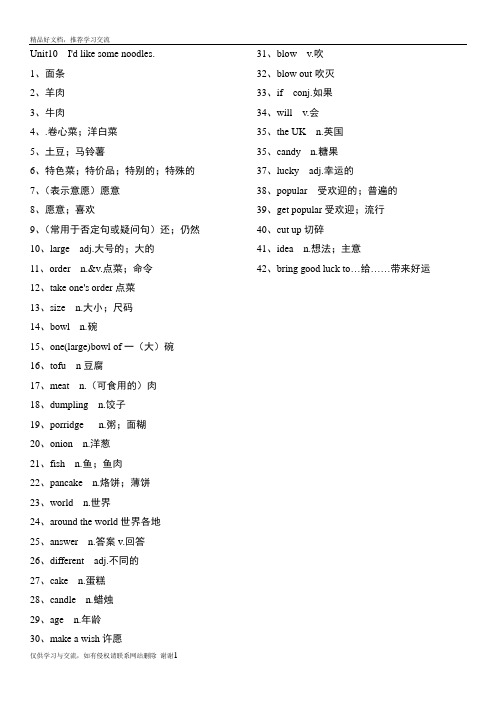
Unit10 I'd like some noodles.1、面条2、羊肉3、牛肉4、.卷心菜;洋白菜5、土豆;马铃薯6、特色菜;特价品;特别的;特殊的7、(表示意愿)愿意8、愿意;喜欢9、(常用于否定句或疑问句)还;仍然10、large adj.大号的;大的11、order n.&v.点菜;命令12、take one's order点菜13、size n.大小;尺码14、bowl n.碗15、one(large)bowl of一(大)碗16、tofu n豆腐17、meat n.(可食用的)肉18、dumpling n.饺子19、porridge n.粥;面糊20、onion n.洋葱21、fish n.鱼;鱼肉22、pancake n.烙饼;薄饼23、world n.世界24、around the world世界各地25、answer n.答案v.回答26、different adj.不同的27、cake n.蛋糕28、candle n.蜡烛29、age n.年龄30、make a wish许愿31、blow v.吹32、blow out吹灭33、if conj.如果34、will v.会35、the UK n.英国35、candy n.糖果37、lucky adj.幸运的38、popular 受欢迎的;普遍的39、get popular受欢迎;流行40、cut up切碎41、idea n.想法;主意42、bring good luck to…给……带来好运仅供学习与交流,如有侵权请联系网站删除谢谢1一年级语文上册第二单元试卷分析(2012—2013学年度第一学期)一、基本情况本次试题内容较全面,其中以拼音为主,95%以上的学生掌握拼音较扎实,大多数学生字迹工整,书写规范,卷面整洁。
二、试卷分析第一题、把下面的声母和韵母分类抄写在四线格里。
这道题侧重拼音基础知识的考察,本题得分率98%,说明学生对拼音掌握得较好。
